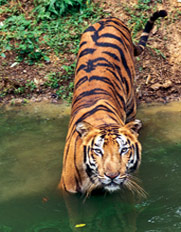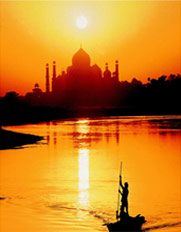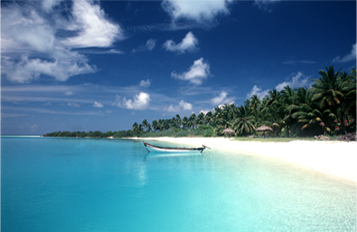 |
 |
 |
 |
Immigration Passport
Citizens of all countries, except Nepal & Bhutan, require a valid national passport or valid travel documents and a valid visa granted by Missions abroad for entering India. Nepalese or Bhutanese citizens need no passport or visa but should possess suitable documents for their identification when proceeding from their respective countries.
VISAS
Requirement For Visa : Foreigners desirous of visiting India can do so after obtaining visa from the Indian Mission in their country of their residence. They should possess a valid National Passport - except in the case of nationals of Bhutan & Nepal, who may carry only suitable means of identification.
Tourist Visas : Usually, a multi-entry visa, valid for a period of 180 days, is granted for the purpose of tourism. The visa is valid from the date of issue.
Collective Visas : The facility also exists for the issue of collective visas to group tours consisting of not less than four members and sponsored by a travel agency recognised by the Government of India. Such groups may split into smaller groups for visiting different places in India after obtaining a collective "licence to travel" from the immigration authorities in India. However, they must reassemble and depart as the original group.
Transit Visas : Transit visas are granted by Indian Missions abroad for a maximum period of 15 days.
Exemption from Registration : Foreigners coming to India on tourist visas for 180 days or shorter period are not required to register themselves with any authority in India. They can move about freely in the counrty, except to restricted/protected areas and prohibited places.
Nationals of Bnagladesh are exempted from registration upto six months. If their stay exceeds six months, they have to register themselves. Individuals without nationality (stateless persons; IRO refugees, persons receiving legal or political protection, holders of Nansen passport etc.) should have valid passports, identity documents or sworn affidavits along with the visa for which they should apply two months in advance.
Family passports issued by other governments are recognised without discrimination.
Landing Permit Facility : Tourists may note the no Landing Permit Facility is available to any foreign tourist landing without a visa. A limited facility exists only for group tours consisting of four or more members and sponsored by a travel agency recognised by the Government of India.
Children of foreigners of Indian origin below the age of 12 may be granetd a landing permit by the immigration authorities upto a period of 90 days to see their relatives, in case they happen to come without a visa.
Tourist Groups : A tourist group arriving by air, ship or by a chartered or scheduled flight may be granetd a collective landing permit for a period of upto 30 days by the immigration authorities on landing, provided the group is sponsored by a recognized travel agency and a predrawn itinerary is presented along with details of passport etc. of the members, and the travel agency gives an undertaking to conduct the group together.
Extension of Visa : As a rule no extension of stay is granted on a Tourist Visa.
Other Types of Visas : If a foreigner wishes to come to India for a purpose other than tourism, he should come after obtaining one of the following visas.
Business Visa : A foreigner can obtain one from an Indian Embassy abroad. A multiple entry visa is valid for 5 years, provided he wishes to come for some business. Foreigners of Indian origin can obtain a 5 year multiple entry visa for business, to meet their relatives etc.
Student Visa : A student visa can be obtained from the Indian Embassy on the production of proof of admission and means of sustenance while in India, etc. The visa is valid for one year but can be extended in India for the duration of the course.
Conference Visa : Delegates coming to attend international conferences in India can be granted Conference Visa to cover the conference as well as for tourism in India. Delegates are advised to apply to Indian Embassies well in advance. ** Employment Visa : Foreigners desirous of coming to India for taking up employment should apply for an Employment Visa, which are issued by Indian Missions abroad. Initially granted for a period of one year, it can be extended in India upto the period of contract. ** Recreation : Foreigners wishing to undertake any international sporting event, trekking, botanical expeditions, yoga, journalists, media men, documentary and feature film makers may obtain visas after due formalities from the Indian Embassy.
CUSTOMS FORMALITIES & REGULATIONS
Visitors are generally required to make an oral baggage declaration in respect of baggage and foreign currency in their possession. They are also required to obtain the Currency Declaration Form from the Customs. They should fill in the Disembarkation Card handed over to them by the airline during the course of the flight. There are two channels for clearance :
Green Channel : For passengers not in possession of any dutiable articles or unaccompanied baggage.
Red Channel : For passengers with dutiable articles or unaccompanied baggage or high value articles to be entered on the tourist Baggage Re-Export Form.
CURRENCY REGULATIONS
There are no restrictions on the amount of foreign currency or travellers' cheques a tourist may bring into India provided he makes a declaration in the Currency Declaration Form given to him on arrival. This will enable him not only to exchange the currency bought in, but also to take the unspent currency out of India on departure. Cash, bank notes and travellers' cheques up to US$ 1,000 or equivalent, need not be declared at the time of entry.
Any money in the form of travellers' cheques, drafts, bills, cheques, etc. in convertible currencies, which tourists wish to convert into Indian currency, should be exchanged only through authorised money changers and banks who will issue an encashment certificate that is required at the time of reconversion of any unspent money into foreign currency. Exchanging of foreign currency other than banks or authorised money changers is an offense under Foreign Exchange Regulations Act 1973.
ARRIVAL & DEPARTURE FORMALITIES
Arrival Formalities : If the visa, for stay in India, is for more than 180 days, a Registration Certificate and Residential Permit should be obtained from the nearest Foreigners' Registration Office within 15 days of arrival. All persons including Indian nationals are required to fill in a Disembarkation Card, at the time of arrival. Four photographs are also required for registration. The foreigners registered at Foreigners' Registration Office are required to report change of their addresses.
Departure from India : All persons, except nationals of Bhutan & Nepal, leaving by air, road or rail have to fill in an Embarkation Card at the time of departure.
Exit Formalities : Every foreigner who is about to depart finally from India shall surrender his Certificate of Registration either to the Registration Officer of the place where he is registered or of the place from where he intends to depart or to the Immigration Officer at the Port/Checkpost of exit from India.
HEALTH REGULATIONS
Foreign tourists should be in possesion of their Yellow Fever Vaccination Certificate conforming to International Health Regulation, if they are originating or transiting through Yellow Fever endemic countries.
AIRPORTS
The international airports in the metrocities offer a range of services ensuring that the traveller on business can continue working while waiting to board an international connection, or when transferring between international flights. These include restaurants, business centers, rest rooms and handy telephones booths. Business centers are equipped with state-of-the-art equipment including wordprocessors and telefax.
Airports also offer tourist dutyfree & handicrafts shopping, informal snack bars, nursery and baby care rooms, and even an art gallery. Dutyfree prices in the airport shops are very competitive, offering you bargains on international merchandise.
FOREIGN TRAVEL TAX
Passengers embarking on journeys to any place outside India from a Customs airport/seaport will have to pay a Foreign Travel Tax (FTT) of Rs. 300 and Rs. 150 on journeys to Afganistan, Bangladesh, Bhutan, Myanmar, Nepal, Pakistan, Srilanka and Maldives. No tax is payable on journeys performed by ship from Rameshwaram to Talaimanar and in case of transit passengers, provided they do not leave the customs barrier. Transit passengers travelling by air who have to leave the airport on accout of mechanical trouble but continue their jouney by the same aircraft and the same flight number by which they arrive are also exempt from FTT. Transit sea passengers leaving the ship for sightseeing, shopping etc. during the ships' call at any of the Indian ports will not be required to pay FTT.

103, Shriram Bhawan, Ranjeet Nagar Commercial Complex
New Delhi 110 008.
Tel: 42030300, 25702737, Fax: 91-11-25702636
E-Mail: midtown@airtelmail.in, midtown@del2.vsnl.net.in
Travel Information || Festivals & Fairs || Shopping || Cuisine || Music & Dance || Art || Tourist Restricted Area || Passports and Visas || Weather || Rajasthan || Kerala || Taj Mahal || Wildlife || India Hotels || India Travel Guide || Honeymoon Tours

